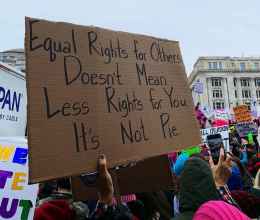We applaud the work of the Permanent Commission on the Status of Racial, Indigenous and Maine Tribal Populations, which applied a racial equity lens to 454 bills in the 129th Legislative Session, and selected 46 bills that center addressing racial disparities. The Permanent Commission's report recommends prioritizing passage of 26 of these bills (identified as Tier 1 bills) if the Legislature comes back into special session. Bills the ACLU of Maine has supported, including LD 776 and LD 1421 (criminal legal reform) and LD 2094 (tribal sovereignty), are Tier 1 bills highlighted by the Permanent Commission’s report.
We support the recommendations of the Permanent Commission, including passage of achievable bills that would improve the lives of Black Mainers, tribal members, people of color and immigrants. In addition, we support the long-term recommendations the Permanent Commission makes. These include the prescription that future lawmaking be guided by a racial equity lens, that future lawmaking should proactively address racial disparities, and the creation of a Task Force to forward legislative priorities to overcome racial disparities.
The following can be attributed to Alison Beyea, executive director of the ACLU of Maine:
“The Permanent Commission’s report shows that the effects of racism are apparent in every aspect of life for Black Mainers, tribal members, people of color and immigrants: from housing to healthcare, from interactions with the criminal legal system to the very foundational promise of equal protection before the law.
“Maine is not immune to systemic racism. Centering racial equity in our policymaking is a key way to address entrenched racism. Looking forward, we support the adoption of racial impact statements for pending legislation, so that we know about disparate racial effects before we adopt legislation.”
About the Permanent Commission on the Status of Racial, Indigenous and Maine Tribal Populations
The Permanent Commission on the Status of Racial, Indigenous and Maine Tribal Populations was created by the Maine Legislature and signed into law in 2019. It is tasked with forwarding “programs that create and improve opportunities and incorporate the goal of eliminating disparities for historically disadvantaged racial, indigenous and tribal populations in Maine.” The Permanent Commission represents a historic moment for Maine: it is the first time a government body is recognizing institutional racism as a policy matter and putting forward prescriptions on how to address it.





